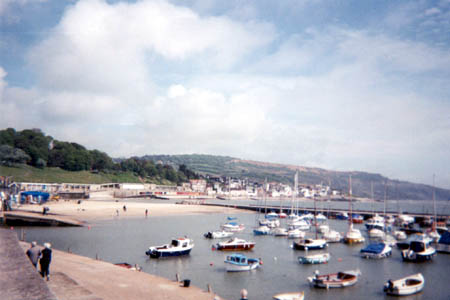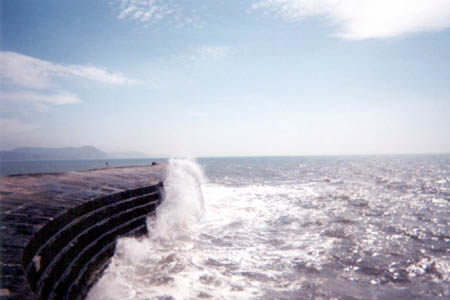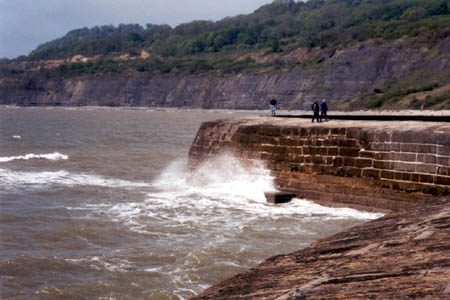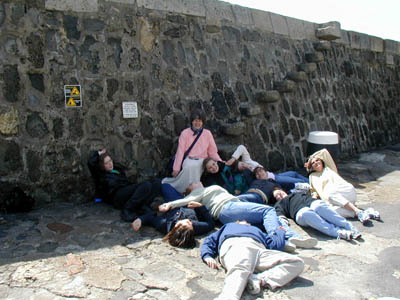
While we were staying in Bath, Professor Spies arranged for the group to take a road trip through the rural English countryside to Lyme Regis. Lyme Regis, or “Lyme” as Jane Austen called it, is a charming resort town through which gently flows the River Lym. Lyme Regis is situated on Lyme Bay which flows into the English Channel. A massive, serpentine breakwater called The Cobb, said to date from the 13th Century and constructed of oak beams and huge boulders, is one of Lyme’s most notable features.
Jane Austen vacationed in Lyme Regis with her family a number of times and participated in Assembly Balls and the daily life of Lyme. In her novel Persuasion, Ms. Austen featured The Cobb and its perilous, stepping stone staircase known as "Granny’s Teeth."
Jane Austen’s tone when she corresponds from Lyme about Lyme and the tone she expresses in Persuasion are somewhat different. One must wonder if she kept her actual feelings within her stories and adopted a crisp, caustic, critical voice for her correspondence. For example, in a letter to Cassandra dated Friday, September 14, 1804, Jane writes:
"I continue quite well, in proof of which I have bathed again this morning. It was absolutely necessary that I should have the little fever & indisposition, which I had; -- it has been all the fashion this week in Lyme." (Letters, 92)

"We are quite settled in our Lodgings by this time, as you may suppose, & everything goes on in the usual order. The servants behave very well and make no difficulties, tho’ nothing certainly can exceed the inconvenience of the Offices, except the general Dirtiness of the House & furniture, & all its Inhabitants.—Hitherto the weather has been just what we could wish; -- the continuance of the dry Season is very necessary to our comfort. ... I endeavour as far as I can to ... be useful & keep things in order; I detect dirt in the Water-decanter as fast as I can." (Letters, 93)
However, Persuasion’s heroine, Anne, had a different point of view of a particular home in Lyme. Upon first entering the Harville household, Anne"found rooms so small as none but those who invite from the heart could think capable of accommodating so many. Anne ... was soon lost in the pleasanter feelings which sprang from the sight of all the ingenious contrivances and nice arrangements [employed] to turn the actual space to the best account, to supply the deficiencies of lodging-house furniture, and defend the windows and doors against the winter storms. ... The varieties in the fitting-up of the rooms ... with some few articles of a rare species of wood, excellently worked up, and with something curious and valuable from all the distant countries Captain Harville had visited, were more than amusing to Anne; connected as it all was with his profession, the fruit of its labours, the effect of its influence on his habits, the picture of repose and domestic happiness it presented, made it to her a something more, or less, than gratification. ... Anne thought she left great happiness behind her when they quitted the house." (Persuasion, ch. XI)

Perhaps more significantly, Jane Austen’s feelings about Lyme in Persuasion connect with an experience she had that she mentioned further on in the same letter to Cassandra.
"The Ball last night was pleasant. ... Nobody asked me the two first dances—the two next I danced with Mr. Crawford--& had I chosen to stay longer might have danced with Mr. Granville, ... or with a new, odd looking Man who had been eyeing me for some time, & at last without any introduction asked me if I meant to dance again." (Letters, 94)
Could that incident have been reflected in Persuasion when Anne Elliot is confronted with a mysterious admirer who turns out to be one of Jane Austen’s few, true villains?
"When they came to the steps, leading upwards from the beach, a gentleman, at the same moment preparing to come down, politely drew back, and stopped to give them way. They ascended and passed him; and as they passed, Anne's face caught his eye, and he looked at her with a degree of earnest admiration." (Persuasion, ch. XII)

Jane Austen continues Anne’s intrigue when, later in the day, "Anne, in passing ... quickly from her own chamber to their dining-room," nearly ran "against the very same gentleman, as he came out of an adjoining apartment" (Persuasion, ch. XII). The mysterious man’s identity is soon revealed, and before the end of the story he is also exposed to be an unprincipled cad.
It is interesting that Lyme was the setting of not only Jane Austen’s mysterious villain, but also the "most dramatic incident in the whole of [her] writing outside her childhood burlesques" (Jane Austen’s England, Maggie Lane, 104). That, of course, occurred in Persuasion when Louisa Musgrove toppled off Granny’s Teeth.
"...and she fell on the pavement on the Lower Cobb, and was taken up lifeless! There was no wound, no blood, no visible bruise; but her eyes were closed, she breathed not, her face was like death. The horror of the moment to all who stood around!" (Persuasion, ch. XII)
In addition to an impassioned group reenactment of Louisa’s lying senseless at the foot of Granny's Teeth, the group gathered next to the steps and read the scene that included her leap from the snaggle-toothed stones, above our very heads.

Text by Judith Lambert. Photos by Judith Lambert, Ellen Brown, Aimee Saunders, and Rick Spies.
Formatting, design, and layout by Kelly Giles.
[Home] [Bath] [Lyme Regis] [Winchester] [Jane's Homes] [The Vyne] [London] [Bibliography] [Reports]